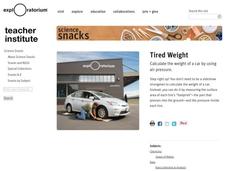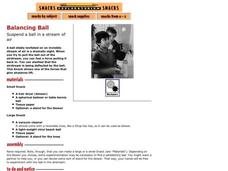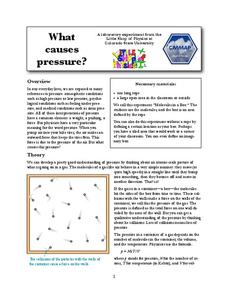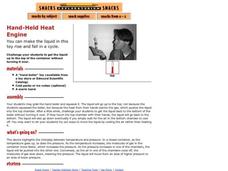Exploratorium
Tired Weight
Take your class out to visit your automobile and use the tires to compute the weight of the vehicle. This is done by measuring the surface of the tire meeting the ground and the air pressure. This is a fun lesson in the relationship...
Exploratorium
Bernoulli Levitator
Two versions of this activity are presented for you to choose from when teaching about Bernoulli's principle in your physical science class. One is a hands-on activity, while the other would be best used as a demonstration during...
Exploratorium
Balancing Ball
Demonstrate lift to the class that is studying aerodynamics. In the stream of air produced by a blow dryer, little physicists place a wad of tissue paper and a spherical figure to compare. Or, if you have a vacuum cleaner and beach ball,...
Exploratorium
Tired Weight
You don't need a scale to determine weight. This activity provides a way to use the concepts of air pressure and surface area to determine the weight of a vehicle by calculating the amount of weight each tire supports.
Teach Engineering
Building a Barometer
Forget your local meteorologist — build your own barometer and keep track of the weather with an activity that provides directions to build a barometer out of a narrow necked bottle, a glass, and some water. Using their barometer,...
Colorado State University
Why Can Warm Air "Hold" More Moisture than Cold Air?—Vapor Pressure Exercise
Does it feel a little humid in here? Learners assume the role of water vapor in the atmosphere as they explore the differences between warm and cold air. They roll dice to determine their level of energy, which determines if they...
DiscoverE
Pilot a Balloon
Balloons will go where you want them to. Young pilots first add paper clips to a balloon to make it neutrally buoyant. They then use cardboard to steer the balloon in different directions, taking air pressure into account.
Colorado State University
What Causes Pressure?
Are you feeling the pressure? Let loose a little with a kinesthetic activity that models molecular motion in a closed space! The activity varies conditions such as volume and temperature and examines the effects on molecules.
DiscoverE
Air-Powered Mini Rocket
Does the position of the clips make a difference? The activity provides directions to build and test a paper rocket. Pupils attach paper clips to the rocket in different configurations and measure the distance the rocket flies each time....
Exploratorium
Hand-Held Heat Engine
See the direct relationship between pressure and temperature using these classic science toys. As individuals hold the glass bulb, the liquid inside reaches it's boiling temperature, which is just a bit above room temperature. As the...
Foundation for Water & Energy Education
How is Flowing Water an Energy Source? Activity C
Can the force of falling water through a tube vary by altering the diameter of the tube or its height? That is what physical scientists aim to discover in this activity, the third in successively more revealing activities on the power of...
Curated OER
Experience Gravity Free Water
Students complete an experiment with a glass of water and cover the opening with cardboard and turn it over. In this gravity lesson plan, students observe how air pressure does not allow the cardboard to fall and let the water out.
Exploratorium
The Dipping Bird
If you have or want to order the dipping bird demonstration, it is useful for showing how evaporation and changes in the pressure of a closed system cause cyclical motion. After teaching about pressure, consider setting this little guy...
Teach Engineering
Rock and Boat
Present the class with a question on whether the water level of a pond will rise they take a large rock out of a boat and drop it into the pond. Groups come down on all sides of the question and try to justify their answers. The activity...
NOAA
How Do We Know?: Make Additional Weather Sensors; Set Up a Home Weather Station
Viewers learn about three different weather measurement tools in installment five of the 10-part Discover Your Changing World series. They build weather vanes to collect data on wind speed, barometers to determine air pressure, and...
Baylor College
Breathing Machine
Take a deep breath and have your class construct working models of a lung! Using 500ml plastic bottles as the chest cavity, and balloons for the lung and the diaphragm, learners work in groups to make a model. The models help them to...
NOAA
Climate, Weather…What’s the Difference?: Make an Electronic Temperature Sensor
What's the best way to record temperature over a long period of time? Scholars learn about collection of weather and temperature data by building thermistors in the fourth installment of the 10-part Discover Your Changing World series....
NASA
Write the Book on Weather Metrics
It's not easy to measure the weather. Pupils learn about what all weather has in common—the atmosphere. Scholars discover how a meteorologists must be able to measure aspects of the atmosphere and decipher the data. They then create a...
Teach Engineering
Equal and Opposite Thrust in Aircraft: You're a Pushover!
It's the law—every action requires a reaction, no matter how small. Pupils experience two demonstrations of Newton's third law of motion as it relates to thrust in the 10th segment of a 22-part unit on flight. Using their mathematical...
Other
Federal Aviation Administration: Air Takes Up Room [Pdf]
See how air takes up space by conducting this classroom experiment. With the aid of several common objects, observe the effects of air pressure.
PBS
Pbs Kids: Science Rocks: Air Lift
Through this experiment, students are challenged to lift a book (and other items) with just air. Requires simple household items, gallon-size, zipper-lock plastic bag, book, pencil, drinking straw, and tape.
Texas Instruments
Texas Instruments: Measuring Air Pressure
This activity is intended for an Introductory Meteorology class; an earth science elective intended for Juniors and Seniors. (It was orginally modifed from an Introductory Meteorology Laboratory Assigment taught to undergraduates at...
TeachEngineering
Teach Engineering: Air Pressure
Air pressure is pushing on us all the time although we do not usually notice it. This activity will discuss the units of pressure and give the students a sense of just how much air pressure is pushing on them.
TeachEngineering
Teach Engineering: Building a Barometer
Students investigate the weather from a systems approach, learning how individual parts of a system work together to create a final product. Students learn how a barometer works to measure the Earth's air pressure by building a model out...



















![Federal Aviation Administration: Air Takes Up Room [Pdf] Activity Federal Aviation Administration: Air Takes Up Room [Pdf] Activity](https://d15y2dacu3jp90.cloudfront.net/images/attachment_defaults/resource/large/FPO-knovation.png)



